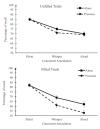Does the Experimenter Presence Affect Verbal Working Memory?
- PMID: 40918616
- PMCID: PMC12412451
- DOI: 10.5334/joc.461
Does the Experimenter Presence Affect Verbal Working Memory?
Abstract
Recent studies showed that the presence of the experimenter hinders executive functions. Belletier and Camos (2018) extended these findings to working memory, reporting a detrimental effect of the experimenter presence only when participants performed an aloud concurrent articulation during maintenance. Under such a condition, participants likely relied on an attentional maintenance mechanism rather that an articulatory mechanism, supporting the account of a capture of attention by the social presence. However, other results using the Stroop Task demonstrate an improvement on executive functions (Garcia-Marques & Fernandes, 2024, for a meta-analysis). Thus, the present study aimed at reassessing the impact of experimenter's presence reported by Belletier and Camos (2018) on a larger sample, with a within-subject manipulation of concurrent articulation, a variation in the secondary task, and the addition of another type of concurrent articulation. In the present study, participants alone or in the presence of the experimenter performed a Brown-Peterson task in which they maintained letters during a 12-second interval, during which they either stayed silent, uttered aloud, or whispered non-sense syllables. They had also to perform either no secondary task, a parity or a location judgement task. Results confirmed Belletier and Camos' (2018) findings, showing that the experimenter presence hindered memory performance when participants performed a secondary task under any type of concurrent articulation. A silent context or the absence of secondary task preserved recall from the effect of experimenter's presence.
Keywords: Attentional Maintenance; Concurrent Articulation; Experimenter Presence; Working Memory.
Copyright: © 2025 The Author(s).
Conflict of interest statement
The authors have no competing interests to declare.
Figures


References
-
- Baddeley, A. (1986). Working Memory. Oxford University Press.
-
- Baron, R. S. (1986). Distraction-conflict theory: Progress and problems. In Berkowitz L. (Ed.), Advances in Experimental Social Psychology (Vol. 19, pp. 1–40). Elsevier Academic Press. 10.1016/S0065-2601(08)60211-7 - DOI
-
- Belletier, C., Doherty, J., Jaroslawska, A., Rhodes, S., Cowan, N., Naveh-Benjamin, M., Barrouillet, P., Camos, V., & Logie, R. (2023). Strategic adaptation to dual-task in verbal working memory: Potential routes for theory integration. Journal of Experimental Psychology: Learning, Memory and Cognition, 49(1), 51–77. 10.1037/xlm0001106 - DOI - PubMed
LinkOut - more resources
Full Text Sources

